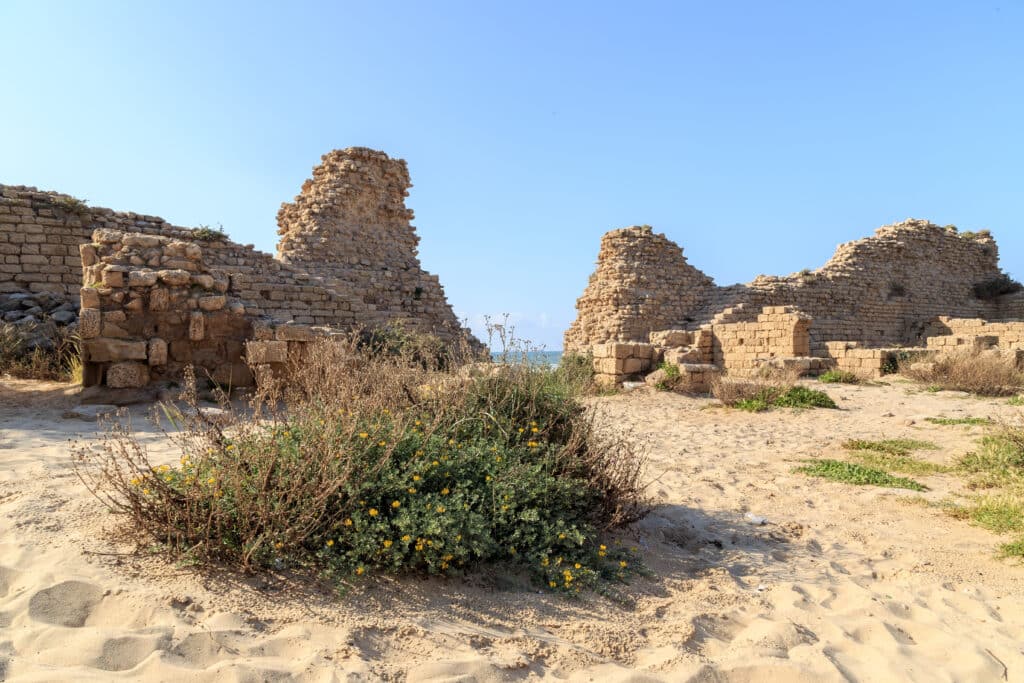In English today, when someone uses the term “Philistine” it is often equated with being uncultured or even barbaric. However, the more we have learned through archeology, we are finding this stereotype grossly inaccurate.
What is more, this stereotype has negatively influenced our understanding of the biblical conflicts of ancient Israel. And while most know that this ancient people group is long lost in the pages of history, some may not realize that we are still talking about their influence today.
Who were the Philistines?
Most historians agree that the ancestors of the Philistines were part of a migratory group called the Sea People. They moved east from the Aegean region sometime in the 13th century BC, after a regional societal collapse.
One of the Sea People groups were called the “Peleshet” – which is the origin of the name “philistine”. Amos 9:7 pointed to this sea-bearing origin as well, when he wrote:
“Have I not brought up Israel from the land of Egypt, and the Philistines from Caphtor…” (emphasis added)
Caphtor is commonly understood to be the island of Crete, the largest of the Greek Islands.
While there are Philistines described in Genesis, who are also believed to be from the distant Aegean Islands and Deuteronomy 2:23 says that the people of Caphtor conquered Gaza and lived there, it seems that the major migration didn’t occur until the 13th century BC.
The Sea People in the Middle East
The first time the Peleshet show up in historical records is in Egyptian writings from the 12th century BC. And the mention is not a positive one.
It records that the group of Sea People attacked Egypt by land and sea. They were soundly defeated, with some of the attacking coalition being completely destroyed.
The Peleshet however were one of the surviving groups. Most likely in exchange for vassalage, Pharaoh Rameses III took some as slaves and settled others in outlying cities on Egypt’s northern border.
That’s right – this is how they came to be in southwest Canaan, specifically Gaza, Ashkelon and Ashdod. The Pharaoh likely wanted them there as a line of defense from attackers from Asia.
Linguistically, since their arrival brought war and destruction to the region, it’s easy to understand how they got their name Peleshet (which became Philistine in English). The word literally means “invaders” or “foreigners” according to Hebrew and Egyptian sources.
The Peleshet Become Their Own People
After being defeated by the Egyptians and settling on the southern coast of Canaan, the Philistines eventually developed into an independent and cultured power.
They quickly grew into what history calls the Philistine Pentapolis – five cities. They included the city states of Gaza, Ashkelon, Ashdod, Ekron and Gath.
Part of what supported their rapid growth and strength was their knowledge of the sea. In the ancient world, experienced merchants and seaports brought a rich culture, treasures from distant lands and the latest technology, specifically in weapons.
This provided a significant regional advantage to a thriving culture of “foreign invaders”.
Soon the Philistines were a notable power threat to the crumbing Canaanite city states and the newly settled Israelites as they moved into the land promised to them by God.
Biblical Conflicts Between Israel and the Philistines
In contrast to the advanced Philistines, the Israelites were just former slaves in search of home. After 430 years in captivity in Egypt, they then lived in the desert for another 40 years.
They were newly freed slaves and low-tech shepherds when they arrived in their promised land. They were a one massive family struggling to get along and with no military experience.
This obvious social comparison was behind the Israelite fears of the bad report of the 10 spies and the reason for God’s constant reassurance to trust His leadership and guidance.
It would be like today’s Bedouin shepherds planning to conquer a western nation. The vast disparity was shocking and visible to everyone.
Without God, they really did feel like grasshoppers! Yet with God’s divine help, Israel entered the promised land.
Philistines’ New Neighbor: Kingdom of Israel
By the time Saul was king, the Philistines still had the technological advantage over the Israelite tribes.
To keep the upper hand, the Philistines did not allow any blacksmiths to be in Israel, to keep them from making weapons. Israelite farmers needed to go to Philistine cities just to sharpen their hand tools.
This plan was clearly working as 1 Samuel 13:21 tells us that Saul and Jonathan had the only 2 swords in all of Israel. Can you imagine only two swords in the entire kingdom? No wonder Israel needed God on their side!
And several years later, God placed an unsuspecting Jewish spy in the Philistine Pentapolis to turn the tide of the conflict.
David and the Philistines
We all know the story of David who faced and slayed Goliath, the giant Philistine warrior (1 Sam 17). But that was just the beginning of this young Jewish hero’s encounters with the Philistines.
After years of running from Saul, David despairingly fled to the Philistines in Gath, looking for safety and found unimaginable favor from their king (1 Sam 27). This was the same king that David greatly feared and acted insane when he first visited, years before (1 Sam 21:10).
Think for a minute about all these twists and turns. In short 16 months of living with the Philistines, David was made one of the king’s chief bodyguards and was believed to have defected from his people and had now been raiding Israelite towns.
David was told by the Philistine king, “You are as good in my sight as an angel of God…”. While the Scriptures don’t specifically say this, with that level of unchallenged trust of the king, it is probable that David became privy to all of the Philistine “state secrets”.
This would mean their technology, culture, weaponry, as well as military size and tactics. God’s secret “007 agent” would have overheard it all as a now trusted chief bodyguard of the Philistine king of Gath.
God’s Secret Agent
Quietly, David was putting all that knowledge into action.
By the time all of Israel crowned David king, 1 Chronicles 12 tells us that the Israelite men who came to David could handle bows, shield and spear, were armed for battle with every kind of weapon of war and could keep ranks.
That is a stunning weapons tech upgrade from when Saul and Jonathan had the only 2 swords in all of Israel!
There is only one way Israel could have obtained these military secrets so quickly – David the warrior/spy/king! Now the nation followed him wholeheartedly. Through the man after His own heart, God was changing Israel’s fate.
Turning the Tide
Once Saul was killed and David was crowned king of all of Israel, the Philistines definitely heard of it. 2 Samuel 5:17 says that “all the Philistines went up to search for David.” This was a personal betrayal and the Philistines wanted revenge.
Yet, from that point on, under David’s leadership and submission to the Lord’s leading, Israel was no longer the underdog. They had the practical and working knowledge of weaponry and tactics on exactly how to defeat the Philistines at every battle.
And finally, as 1 Chron 18:1 tells us, David subdued the Philistines and took Gath… yes, the same Gath he had fled to years before.
God’s secret agent-spy-king turned the tide in God’s chosen land. The Bible says that by the end of his life, David had brought peace to Israel on every side. And the Philistines never fully recovered.
What Happened to the Philistines?
The Philistines did remain a threatening problem for Israel even after David’s reign and the reign of his son, Solomon. But several prophets spoke of God’s complete destruction of the Philistine people and culture. Amos 1:8 tells us:
I will also cut off the inhabitant from Ashdod, and him who holds the scepter, from Ashkelon; I will even unleash My power upon Ekron, and the remnant of the Philistines will perish,” Says the Lord GOD.”
This eventually happened when the Philistines were conquered and deported by Nebuchadnezzar, the Babylonian king. Yes, the same king that initiated the Babylonian captivity of the Jewish people.
You may have not heard much about the Babylonian conquest of the Philistines. But proof of this destruction can be seen today in the archeological excavations of Ashkelon. Like Israel, most of the Philistines were either killed or deported to Babylon.
Yet, while the Israelite remnant eventually returned to the land, the Philistine people soon assimilated to the local Phoenician culture. Their own culture slowly but surely completely died out. As Amos prophesied, the remnant of the Philistines and their cities were gone.
Who are the Philistines today?
While the Philistines have been gone for over 2700 years, we still feel their influence today. How is that possible? You can (still) blame the Romans.
Almost 70 years after the Roman destruction of the Temple in 70AD, the Romans were still taking heavy losses from Jewish revolts.
By 135AD, the final Bar Kochba revolt was crushed. To cement his victory, the enraged Emperor Hadrian made an attempt to stamp out Jewish identity and connection to the region by changing its name.
After all, if you are throwing Jews out of their homeland, you can’t keep calling the land JUDEA.
Thus, Hadrian changed the name of Judea to Syria Palestina. Yes, he wanted to link it to Israel’s ancient archenemy, the Philistines. It was an intended offense to the defeated Jewish population.
The name’s intended message was this: Your beloved nation is gone, you now live in the land of the Philistines. Over time, Syria Palestina became known as Palestine.
Israel, Philistines, Palestinians, and Foreigners
For almost 1800 years, regional conquests have come and gone, yet this land has never been a homeland, nor an official country of any people group other than Israel. No other people group in history can make that bold claim.
This fact may lead to other questions about “foreigners” (or “philistines”) living in Israel and the ancient Philistine city of Gaza. Nevertheless, there is no historical connection between ancient Philistines or Canaanites and today’s Palestinian population.
But in any case, the Scriptures are absolutely clear that Israel is to be good to the foreigners living among them, “because you too were once foreigners in Egypt” (Ex 23:9). So in the Torah God instructs His people to have the same law of justice for the native and the foreigner.
Today, God is fulfilling His word, and He is even using Israel’s ancient and modern conflicts to do so.

God’s Perfect Plan – From Israel to You: Free PDF Download
The Bible is full of God’s promises that can encourage our faith. Together, these promises make up one master plan of God.
You’re about to discover God’s perfect plan through the lens of 25+ references throughout Scripture.
Articles Related to Down the Coast to Gaza: Who Were the Philistines – Neighbors of Israel?
Estimated reading time: 9 minutes



